
meet the team
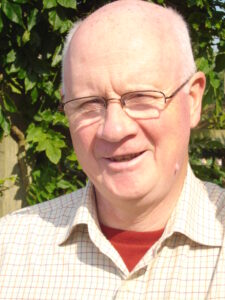
George was 2 when he contracted Polio in the 1947/1948 polio epidemic in Scotland. He considers himself lucky: only one leg was affected. His Mum knew of the efficacy of early physiotherapy, so over many months, she took George on three buses from Cowie to Tillicoultry so that he could receive intensive physiotherapy on his leg and so avoid the need for a caliper. He suffered severe muscle wastage, and a shortening on his lower leg. When he was 18, he had– a triple arthrodesis – which fused his ankle and reduced the shortening to just one quarter of an inch.
Like all Polio survivors, George then got on with his life and being a sporty, outdoors chap, he did things like mountain climbing, basketball, and skiing for many years – determined that Polio would not win.
Although he started work as an engineer, his interest in youth work and adult education, sent him back to college to study Youth and Community Work and then embark on a career, which finally saw him retire as a Manager in Community Education in Dundee.
A member of BPF, he is the representative of the Tayside Group on BPF’s Scottish Committee. As he became aware of the late effects of Polio and Post-Polio Syndrome (PPS), he joined SPPN to contribute to helping raise awareness about LEOP and PPS and to join the campaign for better services for Polio Survivors in Scotland. He be
came Chair in October 2017.
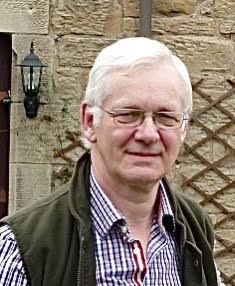
Peter Jones contracted polio in 1947 whilst in hospital undergoing paediatric abdominal surgery. The initial predominant problem identified was ankle drop of the right foot necessitating the use of a below knee calliper until the ankle was arthodesed in 1963.
A qualified pharmacist, with a Master’s Degree in Biopharmaceutics, Peter’s career in hospital pharmacy led him to Edinburgh to take up the post of District Pharmaceutical Officer for South Lothian and assistant Chief Administrative Pharmaceutical Officer at Lothian Health Board, then Acting Chief Administrative Pharmaceutical Officer from 1993-1998 when the post was abolished following another NHS re-organisation. Peter then set up his own pharmaceutical consultancy which he did for the next nineteen years, working for the pharmaceutical industry, advising professional pharmaceutical organisations, providing chief pharmacist cover at hospitals in Lanarkshire and Stornoway, providing training programmes for registered nurses in the nursing home sector as well as nine years sitting on the Fitness to Practise Committee of the General Pharmaceutical Council.
He joined the committee of SPPN several years ago hoping that he might be able to bring to the committee some of his experience and expertise gained from dealing with Health Boards and Government Departments throughout the course of his professional career. An experienced committee man during his professional life, he currently serves on his local Community Council. He is, and also has been secretary of a wide variety of organisations: Incorporation of Hammermen of Edinburgh, scientific societies, the Edinburgh branch of the Friends of Scottish Ballet, and the Edinburgh Renaissance Band.
He recently set up a programme of physiotherapy led hydrotherapy sessions for post-polio patients, at the Oriam Sports Centre at Heriot-Watt University and would be very pleased to hear of any others who would like to take advantage of this facility.
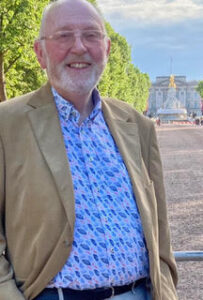
James contracted Polio in September 1958, and was admitted to Cameron Hospital for infectious diseases. He was in an iron lung for a month, before being transferred to PMR in the November until February the following year when he was discharged.
James feels relatively lucky in as much as it is just his arms that were affected and he’s have not had to rely on any Orthotics.
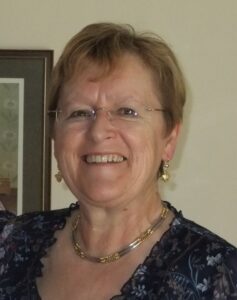
Susan is a retired College Lecturer and Training Consultant who has worked with George in other voluntary organisations. When George agreed to take on the role of Chair, she decided to volunteer to fill the vacant Secretary post since she reckoned she would be acting as George’s secretary anyway and might as well make it official.

Anne contracted polio aged 5. She was paralysed from the neck down and spent 18 months in Cameron Hospital in Fife; the first six months in an iron lung. When she was able to go home, she was left with curvature of the spine, damage to her left shoulder and upper arm and a weakened left side.
Anne wanted to join the police or the army. She passed all the entry requirements except fitness because of the damages caused by her Polio. Neither the police, nor the army could take her on. Anne knew she had to make the very best of her life despite the disadvantages and this has been her mantra ever since.
She worked for Fife County Council in the Finance Department. They paid for her to obtain a degree from Glasgow University and become a qualified accountant. She subsequently enjoyed a varied career in Accountancy. Anne was widowed young and brought up her son and daughter alone. She now has four grand-children and enjoys visiting her family who live in different parts of the country.
Anne came on to the committee in 2019 and became treasurer in 2020. Her interests include Egyptology, swimming, and music. The most recent highlight was seeing Paul McCartney at Glastonbury in 2022 and she plans to return this year.

Lyla contracted polio as a baby in 1966. She has been coping with Post-Polio Syndrome since around 30(ish) although she was not officially diagnosed until many years later when it became apparent that her many symptoms could only be attributed to PPS. Trying to get treatment or recognition of PPS is one of the reasons she joined SPPN as she believes SPPN has been successful in bringing PPS into the public consciousness and campaigning for recognition within the NHS.
Meeting up with fellow polio people is a joy for Lyla, and being a member of SPPN and on the committee, has opened up new friendships.
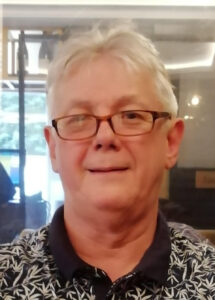
George contracted polio in 1957 aged 2. As was common at the time, his treatment consisted of splints and metal callipers.
After trudging through 38 years of government employment as a civil servant, George now copes in retirement with many of the well-documented symptoms of PPS. This, however, has not prevented his continued participation, over 30 years, as a member of an enthusiastic, if not overwhelmingly talented, ceilidh band.
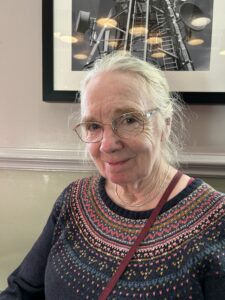
Hazel was 17 months old when she contracted Polio: the first case in Scotland in the 1947 epidemic.
Only her left shoulder was affected, she arm was left swinging uselessly. Until school she wore a bodice with a metal brace splint that held her arm high if she wanted to ask a question; and there was a lot of physiotherapy to do daily at home. She attended Killearn Hospital and Princess Margaret Rose, where the doctors were impressed with the trick movement she developed of clicking the arm onto different muscles to allow a good range of function. This lasted well until she was about forty, until the onset of PPS that has never been formally diagnosed.
Like many polio survivors, she didn’t really realise that she had a disability. Polio was never mentioned. She’d had “Infantile Paralysis” and then just got on with a full life. Hazel worked in various voluntary sector fields, mainly in Edinburgh and Lothian but throughout Scotland and London too, doing casework, policy work and campaigning, training and community development. She whether sometimes wonders whether the polio experience makes her willing to just have a try at anything and everything.